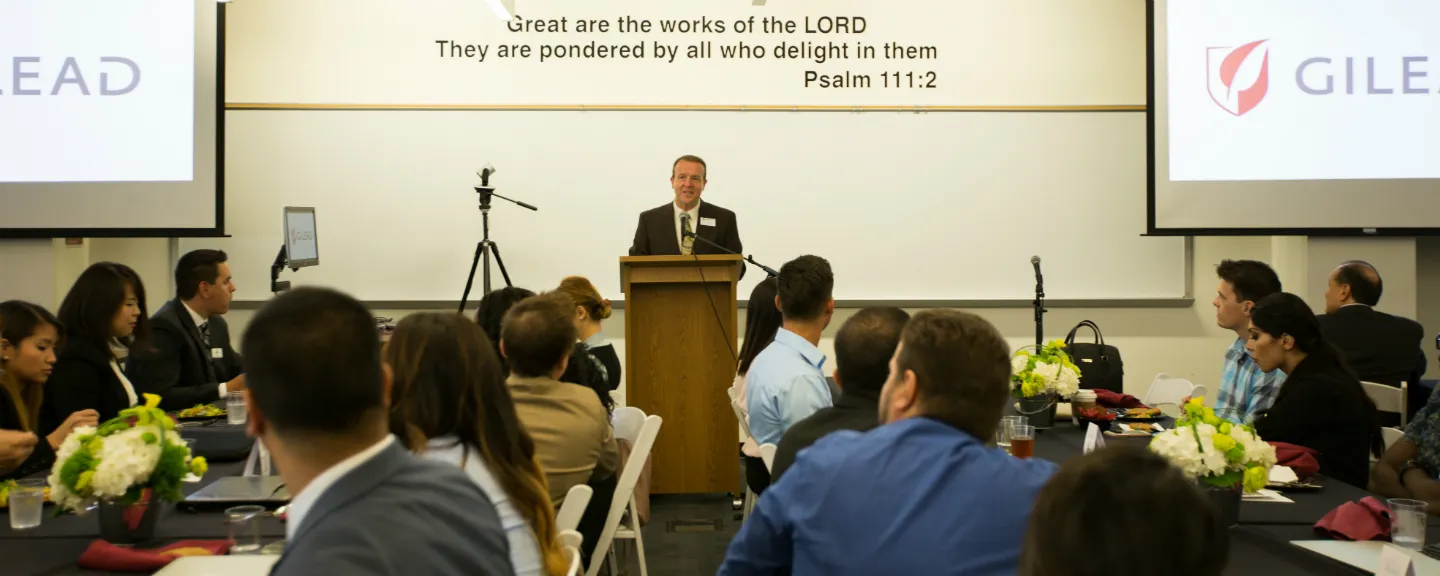- Home
- >
- APU Articles
- >
- News Article
Biotech Leader Partners with APU
September 21, 2017 | Written By Cynndie Hoff

Upon the launch of APU’s new Master of Science in Biotechnology in August 2017, Guillermo “Willie” Zuniga, president and CEO of Grifols, addressed the program’s inaugural cohort and explained his passion for creating a pipeline between the academy and his industry. “We employ more than 900 people in a rapidly growing company, and we want to create a conduit that opens doors for Southern California college graduates at every level,” said Zuniga, whose company manufactures life-saving protein therapies that help treat rare diseases such as hemophilia and immune deficiencies. “We want to partner with schools like APU who produce students with a strong background in science, technology, engineering, and math (STEM) and are exploring career choices. We are especially excited about APU’s applied, hands-on approach—it makes all the difference.”
This type of relationship between education and the marketplace has become increasingly important given the rapidly changing technological landscape and its impact on the way people communicate, do business, and conduct research. Across disciplines, APU assertively seeks these synergistic associations that align research and development goals and efforts, generate collaborative projects, and facilitate the transfer of knowledge and technology. David Dyer, Ph.D., executive director of the new M.S. in Biotechnology program, has already forged such relationships with several local companies in addition to Grifols, including Gilead Sciences, Shire Pharmaceuticals, Johnson & Johnson Biopharma, and Covidien Medtronic.
For graduates, these connections open important doors, but they also benefit the companies seeking qualified applicants. “We’ve been talking for a number of years about creating a biotech corridor,” Zuniga told the San Gabriel Valley Tribune. “The STEM field is growing and we need to inform young adults and even children that this industry does exist and that there are good paying jobs in these fields.” Further supporting these students, Grifols guarantees face-to-face interviews with graduates, provides education reimbursement for employees, and offers summer internships that usually lead to permanent jobs.
Preparing to fill those and similar positions throughout the industry, Azusa Pacific’s first cohort of 24 students (including four current Grifols employees) began the M.S. in Biotechnology this fall. Upon graduation, they can expect to find jobs in any of the burgeoning industry’s five main sectors: biopharma, medical devices, medical testing and research, high-tech manufacturing, and agriculture. According to the 2017 California Life Sciences Industry annual report, 3,040 life sciences companies (192 more than last year) operate in this state alone, and they employ more than 287,000 people. Professionals in this field develop novel drugs (1,269 currently in the FDA approval pipeline), devices and diagnostics (264 devices approved in 2015-16), and applications of biotechnology to produce sustainable energy.
Along with this rapid growth comes parallel progression of ethical concerns regarding the appropriate application of these new technologies, whether there should be boundaries, and who draws those lines. “APU’s program faces these questions head on,” said Dyer. “Students learn from day one how to identify and process ethical dilemmas through business-related bioethics courses and a clear integration of faith-based instruction. This critical ability gives graduates a deeper understanding of the implications of their work and prepares them for the inevitable difficult decisions they will be called on to make.”
“Ethics is very important to Grifols, and we are excited to begin this relationship with Azusa Pacific students who will be well-trained in this area. We manufacture products that keep people alive, nothing is more important. The patients drive us,” said Zuniga who often invites patients to visit the Grifols plant so employees can meet the people they help face to face.
With this shared vision that puts people first, APU and Grifols make a powerful team. Grifols recruits skilled, ethical employees and APU seeks cutting-edge, reputable companies who can provide insight and opportunities for graduates. Symbiotic relationships like these ensure that together the academy and industry will develop leaders who are scientifically sound, ethically informed, and comprehensively qualified difference makers.